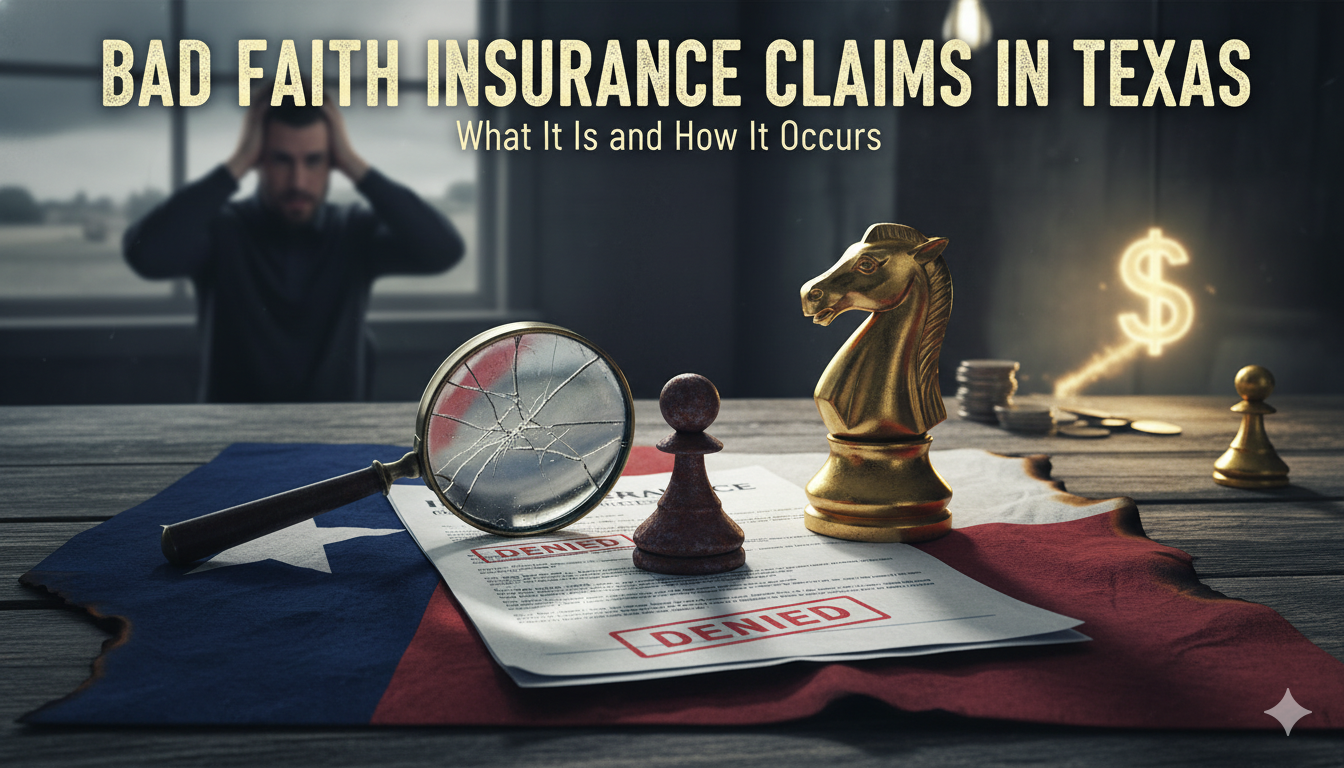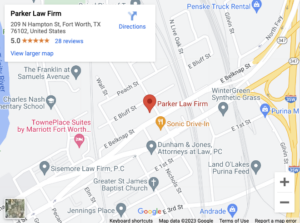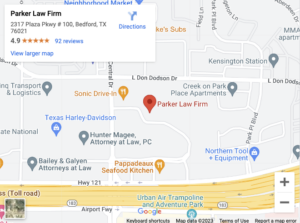Bad Faith Insurance Claims in Texas: What It Is and How It Occurs

If you have the sinking feeling that your insurance company is playing games with you, you’re not being paranoid. After a serious accident or injury, you expect the insurance provider you’ve paid faithfully for years to be in your corner, to honor the contract you both signed. You expect fairness. But when their promises dissolve into frustrating delays, confusing excuses, and insultingly low offers, it’s easy to feel powerless. It’s as if you’re a pawn in a game where the rules keep changing and the odds are stacked against you.
The truth is, you’re often not just facing a difficult process; you’re facing a deliberate strategy. The game is rigged, and it’s designed to protect their profits, not your well-being.
This is the reality of bad faith insurance claims. At its core, insurance bad faith isn’t just a breach of contract; it’s a profound betrayal of trust. Every insurance policy in Texas carries an unspoken, legally implied promise called the “covenant of good faith and fair dealing.” This means the insurance company has a duty to treat your interests with the same level of concern as its own. When they intentionally put their bottom line ahead of your legitimate claim by denying, delaying, or underpaying it without a reasonable basis, it shows a lack of fairness. This kind of behavior is known as acting in bad faith.
This isn’t just poor customer service the law lets you hold them accountable for the money you’re owed and the harm they caused. We’ve seen how this can turn a vulnerable moment into a long, unfair battle no one should face alone. We understand the frustration, and more importantly, we know how to fight back.
Recognizing the Opponent’s Playbook: The Predictable Moves of Bad Faith
Insurance companies are massive corporations that have spent decades, and billions of dollars, perfecting a system designed to minimize payouts. Their adjusters and attorneys are not just evaluating your claim; they are executing a well-rehearsed playbook of tactics intended to wear you down, confuse you, and pressure you into accepting less than you deserve. When you know their moves, you can begin to see the game for what it is. One of the most common and damaging moves is the tactic of unreasonable delays.
They may tell you they’re still investigating, that they’re waiting on paperwork, or that your file is being passed to another department. Each day that passes is another day you’re without the resources you need to pay medical bills and support your family. This isn’t accidental inefficiency; it’s often a calculated strategy. They know that financial pressure mounts over time, making policyholders more desperate and more likely to accept a quick, lowball settlement just to get some relief.
Closely related to this is the tactic of conducting an inadequate investigation. A fair evaluation requires a thorough, objective, and timely review of all the evidence. Instead, a claims adjuster acting in bad faith may only look for information that supports a denial. They might ignore witness statements that favor you, disregard reports from your doctors, or refuse to inspect property damage properly. This creates a biased foundation for their decision, allowing them to claim they have a “reasonable basis” for denying your claim, even when the full picture tells a very different story. We have seen cases where an insurer denied a claim based on a single, out-of-context photo while completely ignoring a mountain of evidence that proved our client’s case. It’s a deliberate strategy of confirmation bias, and it is a classic sign of insurance bad faith.
Perhaps the most blatant moves in their playbook are the misrepresentation of policy terms and the issuance of unjustified denials and lowball settlement offers. An insurer might twist the language in your policy to argue that your injury or loss isn’t covered, knowing full well that most people don’t have the legal expertise to challenge their interpretation. They might deny your claim outright, offering a weak or nonsensical reason in the hope that you’ll simply give up. Or, they’ll make a “nuisance value” offer a sum that is significantly less than your claim is worth to test your resolve.
They are betting that the stress of your situation and the intimidation of their corporate power will be enough to make you walk away with pennies on the dollar. These aren’t just negotiation tactics; they are deliberate moves in a game you were never meant to win. Recognizing these actions as part of a larger playbook is the first step toward taking back control.
The Rise of the Machine: Automated Bad Faith and the New Digital Battlefield
Just when it seemed the game couldn’t get more slanted, a new player has entered the field: artificial intelligence. In their endless quest for efficiency and profit, many major insurance companies are now relying on complex algorithms and AI software to process and evaluate claims. On the surface, this sounds modern and impartial. In reality, it has opened the door to a new, more insidious form of misconduct that experts are calling “automated bad faith.” This is the ultimate rigged system—a faceless, digital gatekeeper programmed with one primary directive: minimize payouts. These systems can analyze thousands of data points to flag claims that deviate from a profitable norm, often recommending denial or underpayment without any meaningful human oversight or empathy.
The danger of automated bad faith is that it systematizes the very tactics that have long defined insurer misconduct. An algorithm can be programmed to automatically undervalue certain types of injuries, to flag claims from specific doctors or neighborhoods as suspicious, or to generate automatic lowball settlement offers based on historical data that favors the insurance company. A human claims adjuster might be persuaded by a compelling story or clear evidence of suffering, but an algorithm feels nothing.
It cannot understand the nuances of your pain, the impact on your family, or the justice you deserve. It only sees data points and profit margins. When your legitimate claim is denied by a machine, you’re left fighting a black box, an opponent with no face and no accountability. This shift makes it more critical than ever to have a human advocate on your side who understands not only the law but also the new digital battlefield where these fights are increasingly waged.
Your Counter-Playbook: Key Defenses in a Complex Game
To beat them at their own game, you have to understand all the pieces on the board not just the ones the insurance company wants you to see. Your own insurance policy contains powerful tools that can be used to protect you, but they are often written in confusing language designed to discourage you from using them fully. One of the most critical of these is uninsured motorist coverage and underinsured motorist coverage, often referred to as UI/UIM coverage.
In Texas, if you are hit by a driver who has no insurance or not enough insurance to cover your damages, your own UI/UIM policy is supposed to step in and act as the at-fault driver’s insurance. This is coverage you paid for, for your own protection. However, making a claim against your own UIM policy can feel like you’re suddenly fighting the very company you thought was on your side. They may use the same bad faith tactics delays, denials, lowball offers to avoid paying you the benefits you are rightfully owed. Understanding the full extent of your UI/UIM coverage and its policy limits is a crucial defensive move that can provide a vital lifeline when you need it most.
Another complex part of the game involves third parties who want a piece of your recovery. When you receive medical treatment after an accident, your health insurer may pay the initial bills. But they will often assert a right of subrogation, which means they can seek reimbursement from any settlement you receive from the at-fault party. Similarly, hospitals and doctors may file medical liens or hospital liens against your future settlement. If not handled correctly, these claims can devour a huge portion of your compensation, leaving you with little to nothing for your pain, suffering, and future needs. Insurance companies know this.
Sometimes, they will try to use the existence of liens and subrogation claims to pressure you into a quick settlement, implying that you won’t see much of the money anyway. A skilled attorney knows how to challenge and negotiate these liens, ensuring that your interests are protected and that the maximum possible amount of the settlement ends up in your pocket, where it belongs. This isn’t just about winning a settlement; it’s about making sure that victory actually translates into a meaningful recovery for you and your family.
Our Unfair Advantage: How We Turn the Tables on Insurance Giants
At Brad Parker Lawfirm, we don’t just play the game; we’ve spent over 35 years studying the opponent, documenting their every move, and building our own counter-playbook. You deserve more than just a lawyer; you deserve a master strategist with an unfair advantage. Our advantage is built on decades of data and relentless preparation. We maintain a robust case management system that is far more than just a digital filing cabinet. It is our proprietary intelligence database, archiving every interaction we’ve ever had with the insurance companies, defense attorneys, and claims adjusters you are now facing. We know their tendencies and which companies consistently make offers below medical bills during pre-litigation negotiations. Also, we know which adjusters are authorized to make fair offers and which ones are trained only to deny and delay.
This deep, historical knowledge gives our clients a tremendous strategic edge. When an insurer makes a lowball offer, we don’t just see it as a negotiation tactic; we compare it against years of data from that specific company and even that specific adjuster. This allows us to know immediately if we are wasting our client’s valuable time with futile negotiations. If our intelligence shows an insurer has a pattern of refusing to settle fairly until a lawsuit is filed, we don’t hesitate. We pivot swiftly and aggressively to litigation, putting them on the defensive and forcing them to respond to our timeline, not the other way around. This data-driven approach allows us to cut through the games and get straight to the heart of the matter, saving our clients time, stress, and uncertainty.
What truly sets us apart, however, is our unwavering readiness to go the distance. Insurance companies keep detailed notes on law firms. They know which attorneys are “settlement mills” who will take any offer to avoid a courtroom, and they know which ones are true trial lawyers who are not afraid to stand before a jury. Our reputation precedes us. We are known for our meticulous preparation and our willingness to take a case all the way to a verdict if that’s what it takes to secure justice. This reputation as formidable trial lawyers fundamentally changes the dynamic of negotiations.
The insurance company knows that their usual playbook of delays and lowballs won’t work on us, because they know we have the experience, the resources, and the resolve to hold them accountable in court. While the vast majority of our cases settle favorably without a trial, they settle for what they’re worth because the other side knows we are always prepared for the final showdown.
Choosing Your Strategist: Finding the Right Attorney for Your Fight
When you are facing a Texas bad faith insurance claim, the choice of attorney is the single most important decision you will make. You are not just hiring legal representation; you are choosing the strategist who will guide you through this rigged game. Many people come to us after being disappointed by previous attorneys who were either unqualified or unprepared for the complexities of insurance bad faith litigation. They discovered too late that their lawyer didn’t understand the opponent’s playbook or, worse, was afraid to challenge it. You need to ask the tough questions to ask a personal injury attorney about bad faith: How many bad faith cases have you taken to trial? What is your strategy when an insurer refuses to make a fair offer? Can you show me results you’ve achieved in cases like mine?
A true advocate in this fight will have a deep understanding of not just the law, but of the insurance industry itself. They should be able to explain the specific tactics the insurance company is using against you and lay out a clear, proactive plan to counter them. They should be transparent about the legal process, including critical deadlines like the two-year statute of limitations Texas imposes on many of these claims. Most importantly, you should feel that they see you as a person, not just a case file. At our firm, we treat you like family. We take the time to understand how this ordeal has impacted your life, your work, and your future. We maintain a smaller caseload so that we can give each client the personalized attention and strategic focus they deserve. This commitment is why we’ve been able to secure life-changing outcomes for families across Texas.
You don’t have to face this fight alone. You’ve been dealt a bad hand, but you don’t have to play it with the cards you were given. With the right strategist in your corner, you can turn the tables, challenge the rigged system, and demand the justice and compensation you are owed. If you believe your insurance company is acting in bad faith, don’t wait for them to make the next move. Take control of the game. Contact us today for a free, confidential consultation. We’ll listen to your story, answer your questions, and show you how we can fight tirelessly for you. And remember, there is never a fee unless we win your case.


